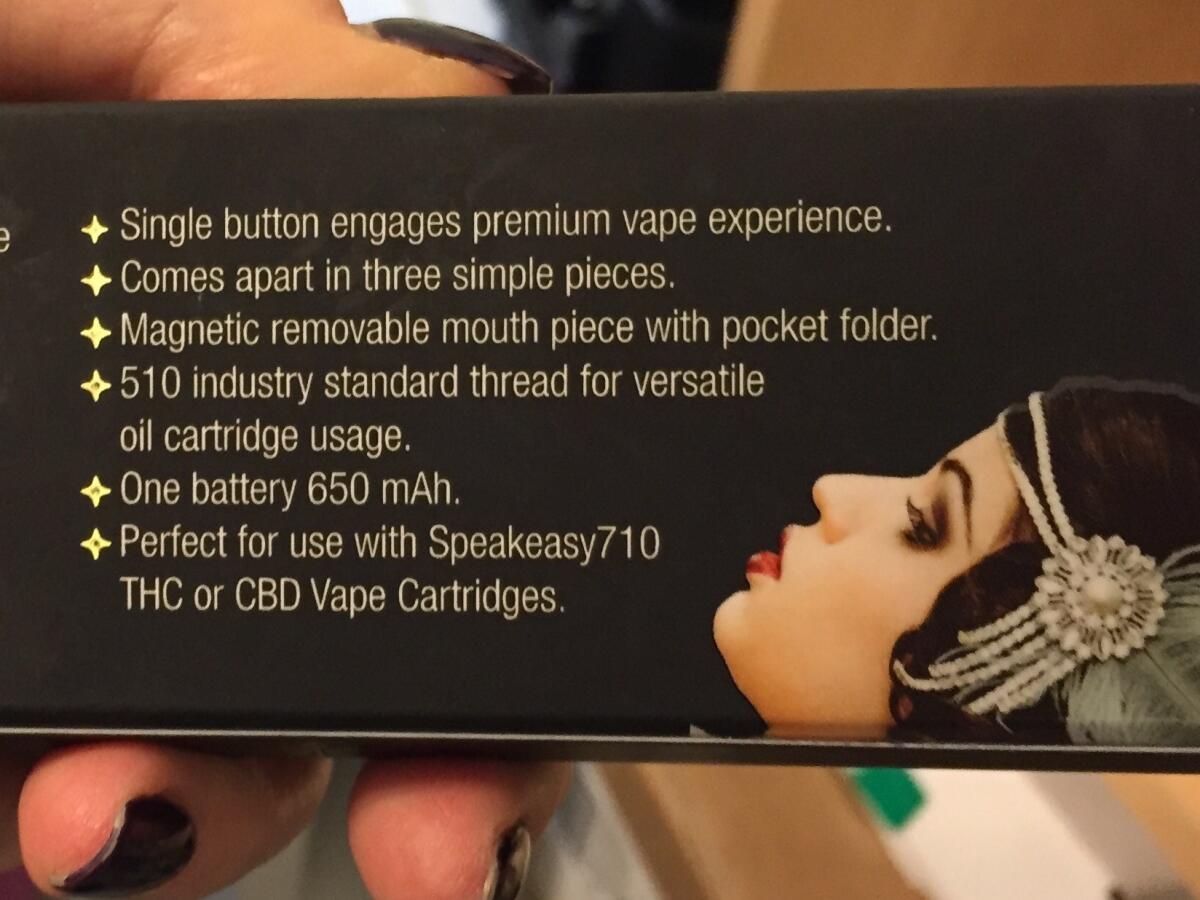Your business is legal, but you can’t use banks. Welcome to the cannabis all-cash nightmare
- Share via
Reporting from Walnut Creek, Calif. — After decades as a corporate operations executive, Julia Gosnell decided it was time to become her own boss.
“It’s now or never,” she told me in the family room of her comfortable East Bay home as her Pomeranian, ChiChi, sat in her lap.
“This is my last good decade of working,” said Gosnell, 54.
She and a good friend had often joked about getting into the cannabis business. She’d been a medical cannabis patient for years, smoking pot for the anxiety she felt over the health of her youngest daughter, who has autism and epilepsy. “I had a choice: take Valium every day or imbibe. I decided cannabis was the healthier route.”
Last March, she and her partner, Kary Radestock, a sales rep, launched Hippo Premium Packaging. They develop containers, logos, bags, labels, boxes and custom-printed jars. They have 10 employees and are about to hire three more.
“So, a farm in Humboldt County calls and says, ‘We are harvesting a crop in 30 days. We don’t have containers, or a logo. Help!’ We helped them figure out how to brand themselves,” Gosnell said. “It’s all very upscale.”
And probably lucrative, eventually.
Gosnell and Radestock project they could gross about $3 million a year. Like most cannabis entrepreneurs, even ones who don’t actually touch pot, their clients will pay them in cash. They will probably not be able to find a bank to take it.
Imagine having to be paid in cash, having to pay your employees and suppliers in cash, having to take care of your payroll, sales and income taxes in cash.
“I was told by an accountant, who closed his door to tell me this, that you just keep your cash under the mattress,” Gosnell said. “Stash it somewhere and find a way to get a big deposit into your account. I said that doesn’t sound legal, but I am told everyone operates this way.”
::
This is the outrageous and untenable conflict imposed on legal businesses by the federal government’s continuing obstinacy about cannabis.
The federal government regards marijuana as an illegal drug; it is classified by the Drug Enforcement Administration as a controlled substance with no accepted medical use, on par with heroin. Banks are regulated by the feds; most will not touch cannabis cash. (Neither will most armored car companies.)
As a result, an estimated 70% of cannabis businesses have no bank accounts.
“We are talking about an industry expected to come short of $7 billion beginning in 2018, with expected tax revenues of approximately $1 billion,” California Treasurer John Chiang told me Friday. “This is trouble waiting to happen.”
It’s already begun.
::
In 2012, an Orange County medical cannabis dispensary owner was kidnapped and sexually tortured by a quartet of thieves trying to find and steal his cash. Rife with gruesome details, that case drew worldwide attention.
But many cannabis growers have been ripped off in less spectacular fashion, or are afraid they will be.
Last month in Sacramento, Chiang heard some of these horror stories during testimony at the first meeting of his Cannabis Banking Working Group.
The goal is to come up with recommendations — including potential federal legislation — to open up banking to this new burgeoning and legal industry. The next meeting is in Los Angeles on Feb. 10.
“Accounts of assault, battery, armed robbery and worse are prevalent in our industry,” Khurshid Khoja, attorney for the California Cannabis Industry Assn., told Chiang’s group last month. “News headlines in recent years also include multiple accounts of armed robberies at dispensary sites, and gun battles in the streets of densely populated California cities.”
And then there are legal terrors: One of the state’s most well-known cannabis manufacturers told me that a company accountant was stopped by officers in a small Southern California city while transporting about $30,000 to the company’s headquarters. Despite showing police her paperwork, they confiscated the cash because, they said, they suspected money laundering. The company is working with an attorney to get it back.
Have you ever seen $250,000 in cash? Me, either. But apparently money takes up a lot of room.
“We’re close to a crisis when it comes to how to manage the situation in legal fashion,” said Kathleen Van Osten, a consultant who represents a “regulatory-minded” San Jose cannabis manufacturer. “They’re running out of space to store cash.”
Also, dealing with cash is not cheap.
Khoja said one of his clients has 60 employees, and an accounting team of four, plus a controller — “nearly unheard of” for a company that size. The firm pays $325,000 a year in salaries to people who deal only with cash handling, and estimates it loses $1 million a year to the various burdens cash imposes.
Casey O’Neill, a cannabis and vegetable grower from Mendocino County, told Chiang that his company, Happy Day Farms, was on its third bank. He lost his last bank account because he is a spokesman for the California Growers Assn., one of the state’s largest cannabis trade groups. His bank told him, “We saw you on TV, bud. Your account is gone.”
And then he added, understandably, “I want to put this out to the universe. You’re not going to see a lot of cash if you come to my house.”
::

Ten days ago, Gosnell and Radestock moderated a branding session at a High Times-sponsored marijuana summit in Los Angeles. They were deluged with inquiries from prospective clients. Theirs is the kind of enterprise that will be increasingly sought after as cannabis entrepreneurs jockey for shelf space during California’s post-legalization boom.
“We have thirty grand coming in the next two weeks from clients in four different deposits,” she said. “And we’re about to move forward with a six-figure job. It’s very scary. But it’s not the weed that’s causing the problem.”
It’s the cash. And, of course, the federal government.
Get more of Robin Abcarian’s work and follow her on Twitter @AbcarianLAT
Twitter: @AbcarianLAT
ALSO
Drug War overkill: A Yolo County raid goes too far
Legalization is opening new doors for pot entrepreneurs







